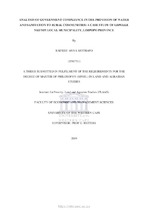Analysis of government compliance in the provision of water and sanitation to rural communities: a case study of Lepelle Nkumpi local municipality, Limpopo province
Abstract
A persistent challenge facing especially post-apartheid South African rural municipalities is
service delivery compliance. Under the guise of scarcity, rural municipalities repeatedly do not
comply with legislation, policies and guidelines for the provision of drinking water and basic
sanitation services for the poor. Yet, such challenges concern equity, justice and fairness to
social policy and seriously impact the sustainability of livelihood of millions of rural
households. The main objective of this study is to analyse the extent to which Lepelle Nkumpi
Local Municipality has complied with or deviated from specific policies and legislation
governing the provision of water and sanitation services at the Gedroogte, Ga Molapo and
Magatle (in Zebediela) rural communities and the response of communities. The study was
also intended to determine the extent to which water challenges affect the livelihood of the
people in the communities. It highlights the refugee-like conditions that millions of South
African citizens experience despite official statistics that claim that 86% of the country has
access to potable water. A mixed methods design was used for this analysis. The qualitative
methods that are used in the study include use of in-depth interviews, site visits, personal stories
and the Municipal Integrated Development Programme (IDP). Participatory mapping of water
sources; story-telling about water issues; timelines and trend lines by focus group members;
transect walks and 7 key informant interviews were used to collect data. A total of 657
quantitative interviews were conducted in three communities. Service delivery compliance has
been grossly ineffective and inefficient in Lepelle Nkumpi Local Municipality, especially in the
Gedroogte, Ga Molapo and Magatle rural communities. The findings were that these rural
communities still depend on state-owned boreholes for accessing drinking water, which are
regularly broken and/or in disrepair. Sanitation service provision in the rural communities does
not comply with the approved policy of providing ventilated improved pit (VIP) toilets. New
settlements have increased the demand for clean water. Shortages of staff with relevant skills
such as management, technicians, and administrators are one of the main reasons why there is
a scarce supply of drinking water and basic sanitation services at the Gedroogte, Ga Molapo
and Magatle communities. Inaccessibility to nearby treatment plants for waste disposal services
(situation per community) and inaccessible disposal facilities and the use of disposal sites also
affect the health conditions of community members within the Lepelle Nkumpi Local
Municipality.

